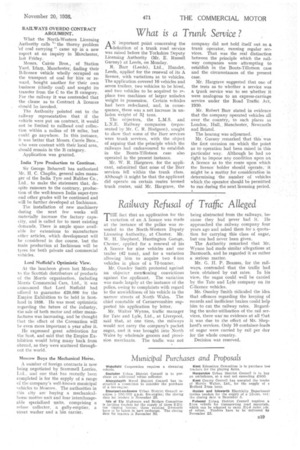What is a Trunk Service ?
Page 33

If you've noticed an error in this article please click here to report it so we can fix it.
AN important point concerning the definition of a trunk road service was raised before the Yorkshire Deputy Licensing Authority (Mr. E. Russell Gurney) at Leeds, on Monday.
R. Barr (Leeds), Ltd., Hunslet, Leeds, applied for the renewal of its A licence, with variations as to vehicles. The application covered 10 vehicles and seven trailers_ two vehicles to be hired, and two vehicles to be acquired to replace two machines of larger unladen weight in possession. Certain vehicles had been redeclatecl, and, in consequence,, there was a net increase in unladen weight of 31 tons.
The objectors, the L.M.S. and L.N.E. Railivay companies (repre: sented by Mr. C. R. Hodgson), sought to show that some of the Barr services were trunk services, with the object of arguing that the principle which the railways had endeavoured to establish in the Bouts-Tillotson case also operated in the present instance.
Mr. W. R. Hargrave, for the applicant, submitted that none of the Barr services fell within the trunk class. Although it might be that the applicant did operate on certain routes termed trunk routes, said Mr. Hargrave, the company did not hold itself out as a trunk operator, running regular services. That was the real distinction between the principle which the railway companies were attempting to establish in the Bouts-Tillotson case and the circumstances of the present case.
Mr. Hargrave suggested that one of the tests as to whether a service was a trunk service was to see whether it were analogous to an express-carriage service under the Road Traffic Act, 1930.
Mr. Robert Barr stated in evidence that the company operated vehicles all over the country, to such places as London, Hull, Manchester, Newcastle and Bristol.
The hearing was adjourned.
Mr. Gurney remarked that this was the first occasion on which the point as to operation had been raised in this particular way. Although he had no right to impose any condition upon an A licence as to the route upon which the licence holder should operate, it might be a matter for consideration in determining the number of vehicles which the operator shoidd be permitted to run during the next licensing period. •




























































































